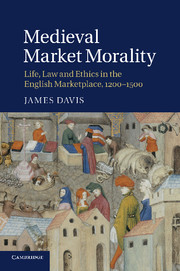Crossref Citations
This Book has been
cited by the following publications. This list is generated based on data provided by Crossref.
Casson, Mark
and
Lee, John S.
2011.
The Origin and Development of Markets: A Business History Perspective.
Business History Review,
Vol. 85,
Issue. 1,
p.
9.
CASSON, CATHERINE
2012.
Reputation and responsibility in medieval English towns: civic concerns with the regulation of trade.
Urban History,
Vol. 39,
Issue. 3,
p.
387.
Hale, Matthew
Raymond, Graham
and
Wright, Catherine
2013.
List of publications on the economic and social history of Great Britain and Ireland published in 2012.
The Economic History Review,
Vol. 66,
Issue. 4,
p.
1134.
Schüssler, Rudolf
2014.
The Cambridge History of Medieval Philosophy 2 Volume Set.
p.
517.
Kadens, Emily
2015.
The Medieval Law Merchant: The Tyranny of a Construct.
Journal of Legal Analysis,
Vol. 7,
Issue. 2,
p.
251.
Campbell, Bruce M. S.
2016.
The Great Transition.
2016.
The Smoke of London.
p.
17.
Carvajal de la Vega, David
2020.
Pleitear por deudas en Castilla a fines de la Edad Media e inicios de la Moderna.
Anuario de Estudios Medievales,
Vol. 50,
Issue. 1,
p.
61.
Blanton, Richard E.
Fargher, Lane F.
Feinman, Gary M.
and
Kowalewski, Stephen A.
2021.
The Fiscal Economy of Good Government.
Current Anthropology,
Vol. 62,
Issue. 1,
p.
77.
Sutherland, Annie
2022.
Openness in Medieval Europe.
Vol. 23,
Issue. ,
p.
145.
Lizzul, Giorgio
2023.
Reassessing the Moral Economy.
p.
117.
Quaas, Franziska
2023.
Reassessing the Moral Economy.
p.
45.





